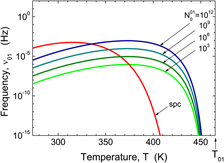Article contents
Modeling of phase transitions in three-phase polymorphic systems: Part II. Effects of material characteristics on transition rates
Published online by Cambridge University Press: 01 July 2011
Abstract

Nonequilibrium phase composition in multiphase systems affects physical properties of many materials. Development of phase composition is controlled by external conditions and material characteristics. Based on the model presented in the Part I [A. Ziabicki and B. Misztal-Faraj, J. Mater. Res. 26(13), (2011)], rates of phase transitions in a three-phase model monotropic system composed of an amorphous (liquid) phase and two solid polymorphs have been analyzed. Effects of material characteristics including activation energy of molecular mobility, heat and entropy of the transitions, interface tensions, and concentration of predetermined nuclei have been discussed.
- Type
- Articles
- Information
- Copyright
- Copyright © Materials Research Society 2011
References
REFERENCES
- 2
- Cited by


